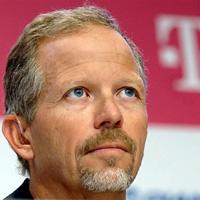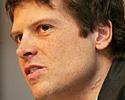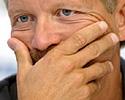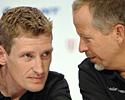News feature, April 5, 2007
T-Mobile boss reacts to Ullrich's DNA findings

|
T-Mobile has led the way in setting up programs to ensure a cleaner sport inspired by last year's Operación Puerto. The connection of its former rider, Jan Ullrich, to the Spanish investigation led to the reshaping of the Germany-based team from top to bottom. Bob Stapleton spoke with Cyclingnews' Gregor Brown to give his reactions on Ullrich's DNA linking to Eufemiano Fuentes and the positives that can come from this situation.
On Tuesday afternoon, German public prosecutor Fred Apostel told sports news agency sid that the comparison with a DNA sample taken from Ullrich's saliva demonstrated "without a doubt" that the blood seized by the Guardia Civil last year during the raids of Fuentes' offices belonged to the now-retired German cyclist. Before this, the bags marked with "Jan", "number 1", or "Hijo Rudicio" ('son of Rudy') could not be clearly considered to contain the blood of Ullrich, but now it would seem the situation has changed.
"My initial reaction was not of surprise," said Stapleton from his home in California as he prepared to take his child to school. "I guess the only thing that has been surprising is how bad this has been handled by Jan's advisors."

|
He brushed off any ideas that the blood had been somehow manipulated by Spanish investigators during their work. "I think this conspiracy theory is putting a bitter end on what was a pretty remarkable career that Jan had," he said. "I prefer to remember Jan as an outstanding bike rider that made some mistakes. To see him advised in this unusual and increasingly unrealistic public position is really painful."
Ullrich stopped cycling when T-Mobile asked him to leave the 2006 Tour de France on the eve of its departure from Strasbourg. It was a slow and painful march for the 1997 Tour winner, that seemingly ended when he announced his retirement on February 26. Stapleton agreed when asked whether Ullrich had plenty of opportunities to bow out gracefully.
"I think that unfortunately this bad advice is something that he has gotten all throughout his career," noted Stapleton. "There were many chances to leave on a better note than the one he is faced with now."
DNA Testing
"It looks like DNA testing can bring about answers, and here is a pretty clear example that it can."- Bob Stapleton is a supporter of DNA testing. |
Stapleton helped lead the change in T-Mobile last fall, which included the implementation of its new blood profiling methods. He believes that the collection of DNA sample now would help prevent another Puerto type scandal.
"My hope that there will be more DNA testing and I hope that Jan's case underlines the need for this," continued the American, whose voice was giving way. "Here were fifty something riders who were identified [in Operación Puerto] and the entire sport now has this albatross around its neck regarding doping. Now we are seeing a process that works [with Ullrich caught]. It looks like DNA testing can bring about answers, and here is a pretty clear example that it can."
Wednesday's news of Ullrich's test results spread like a wildfire, first through Germany, then throughout the world. One of the blood bags from the Spanish investigation was definitively linked to Ullrich after an investigation which started 10 months prior. It was good and bad news for T-Mobile; good because it had washed its hands of an involved rider and implemented a completely new team structure but bad because once again the name "T-Mobile" was being linked with doping.
"I think the company is in this for the long haul," noted Stapleton. "Before [the DNA findings] there were some comments that it took action too soon or it reacted too hard. And it was on a personal level: there was a lot of personal support for Jan at the company, and there was also an enormous financial support.

|
"I think at one level it confirms that they acted in an intelligent and informed manner," he continued. "T-Mobile as a company wants to help push forward clean and fair sport in cycling. I believe that Jan's case only came to this conclusion because of the remarkable media and public attention, and a very determined prosecutor in Bonn."
The reaction from Ullrich's attorney was unusual, asserting that the evidence of blood from their client does not mean there was doping. One of his attorneys, Peter-Michael Diestel, noted to N24 TV channel that, "I also have blood of mine in various places. I have a doctor in Rostock, another one in Berlin, another one wherever... This doesn't mean that the blood was manipulated, that it was used for doping purposes."
Stapleton wisely answered to this theory: "My view is you can peel off part of the onion and you say 'that does not smell too bad', but when you take the whole onion and put it in front of the judge or jury, then you are able to put the pieces of puzzle together quite nicely. I think on some athletes [involved in the Puerto investigation] there will be an astonishing amount of evidence.
"From what I have seen there is a major amount of circumstantial evidence and what is missing is the absolute identity of the individual," he continued to explain. "There is lots of physical evidence, with tapped phone calls, text messages, film... a lot of it is coded but once you establish the identity then those code names become very easy to decipher. I think that anyone who is betting that the rest of those connections won't be made is making a fool's bet."
Learning from mistakes
Stapleton hopes that the riders linked to Operación Puerto can be clearly identified but he at least wants the cycling body to learn from its mistakes and commit to sound anti-doping methods. He pointed to uniformity amongst the teams and eliminating possibilities of cheating the system.
"First, a resolution in Puerto where those riders are identified, and secondly, a change in the sport where some of the loop holes around blood doping are closed," he recommended. "And by that I mean implementing the new blood volume tests and DNA tests, so that for these circumstances comparisons can be used. Right now there is not a broad acceptance for approved testing methods or the use of DNA for these purposes."

|
To stop the riders who were allegedly linked with Eufemiano Fuentes from racing Stapleton suggest teams holding true to the pact that was originally made last October in Paris, where teams agreed not to engage such riders. "I would like to see a commitment across the ProTour, like the one that was originally in place, saying that these riders would not be hired until there was a resolution.
"I think we have to go back and say, 'are teams and athletes willing to step forward and do this?'" he continued. "And if they are not, we need to take action across the sport to either compel this DNA testing or make a much more uniform commitment to change the procedures for the future. There has to be some positive result from Puerto."
One team who was forced into the corner from that October meeting in Paris was Discovery Channel. The American team subsequently hired Ivan Basso, who was also linked to the Spanish investigation, claiming that there was not a legal reason preventing them from doing so. "I think that if they [Discovery representatives] have committed to DNA testing then they should make DNA available for an evaluation of the blood that has been collected," said Stapleton. "And they need to firmly commit to making changes in the sport regarding sanctions for blood manipulation.
"I would like to see the investigation re-opened and I think the teams that are involved need to support it," he continued. "I don't want to pick on Discovery: they are a provocative example. But my problem is that the actions from team to team are uneven; we need a uniform commitment to improve the sport. Right now you have three different camps, some teams put in serious anti-doping campaigns, others that are very much 'wait and see' and others, who have athletes that actively involved in doping, that are back to business as usual."
T-Mobile gives an example to follow
"Hopefully this is a rallying point for the sport to take some action."- Stapleton feels cycling has a chance
to address its doping problem, |
Stapleton pointed towards T-Mobile's wide-reaching code of conduct governing its riders as an example for other teams and as a way to prohibit cheating. "We have in our contracts that riders provide DNA samples, and we have the ability to use those samples to determine if they have complied with their contract," he noted. "Our code of conduct is very broad, so any form of intent to cheat or misrepresentation is basis for termination, fines or suspension. And we do blood volume testing, so if there is some chance you are involved in blood manipulation there is the chance we are going to catch you directly.
"Right now the basis of law is a positive blood test or direct procession of banned substances," he continued. "However, what we are saying [is] that if we have reasonable evidence of involvement in an effort to cheat then we can act on that. So I think that our ability to react is much broader than what the sport has right now, and I would like to see that same kind of idea applied across the ProTour."
Before the start of the Paris-Nice the UCI unveiled a new anti-doping program that would introduce out-of-competition tests on all ProTour riders, a program that Stapleton supports.
"I think what the UCI has offered is a good plan: it implements blood volume testing in a research mode in the next year," he said. "I would like to see that accelerated. And it starts to implement target methods, or key times when athletes are likely to be doping. It also targets riders that don't often get tested.
"There has to be a much broader code of conduct for riders and teams, a fundamental commitment to DNA testing that would be used exactly for these purposes, and a full commitment and uniform action across the sport," he added. "This [Ullrich's DNA findings - ed.] is another wake up call for the sport. It is further, scientific proof that athletes were involved and that this is a major, major doping ring with in the sport. It can't just be that a single guy bears the full weight of this on his shoulders and that there is no other action taken across the sport. That would just be a travesty."
Next week, Stapleton will return to Europe to follow his team, starting with the Paris-Roubaix. He wants that the sport steers away from scandals and returns to racing but sees the recent findings as an opportunity for change.
"I would like to get back to the racing; I don't like this sort of doping police role that T-Mobile finds itself in," he declared. "When you see something like this you have to do something and hopefully this is a rallying point for the sport to take some action. Hopefully this will be the basis to renew the anti-doping efforts."

